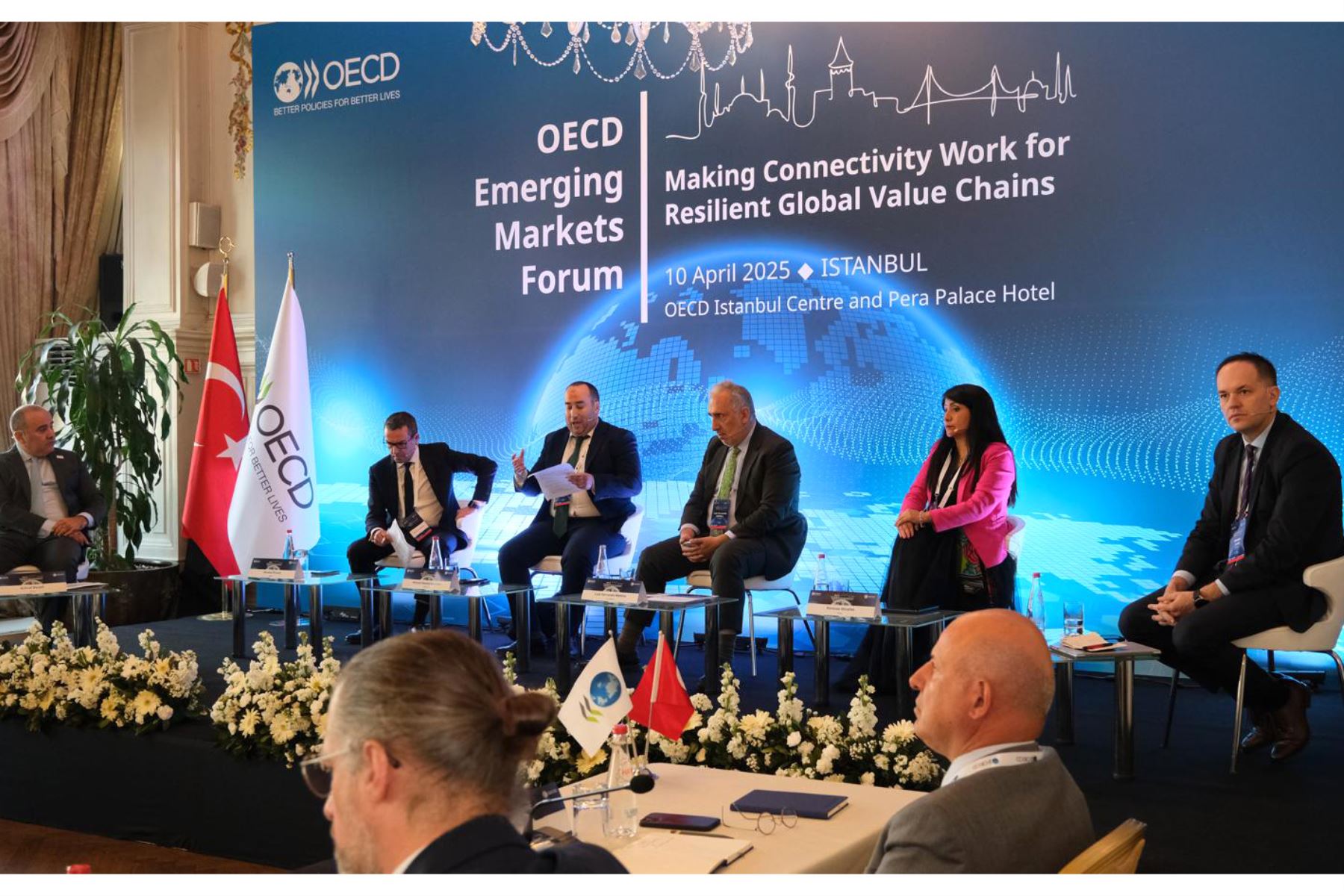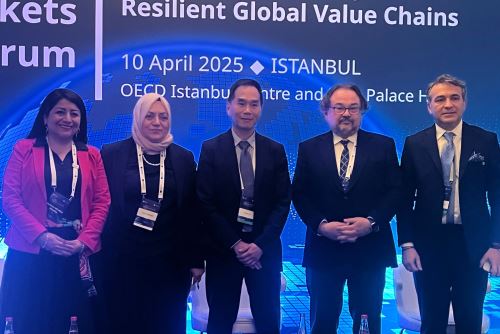Peru's MEF: Innovative financing mechanisms key to closing infrastructure gaps

Photo: Ministry of Economy and Finance of Peru
In Turkey, Peru's Deputy Economy Minister Denisse Miralles emphasized that innovative financing mechanisms and increased private sector participation are essential to closing infrastructure gaps in emerging economies such as Peru.

Published: 4/11/2025
The Peruvian government official spoke at the Emerging Markets Forum, "Making Connectivity Work for Resilient Global Value Chains," organized by the Organisation for Economic Co-operation and Development (OECD).
At this event, the deputy minister stated that Peru is strengthening its Public-Private Partnership (PPP) mechanism to attract private investment.
This effort includes clear guidelines to develop long-term, sustainable projects underpinned by a strong macroeconomic framework and a robust project portfolio.
Miralles noted that, within this framework, Peru has developed major PPP projects including: Lima and Callao Metro Line 2, Jorge Chávez International Airport in Lima, hospitals in Piura and Chimbote, the Central High-Performance School (COAR), and Group 2 of the 2023–2032 Transmission Plan, among others.
Likewise, she reported that Peru has a National Infrastructure Plan for 2022–2025, focused on sustainable infrastructure, which has enabled private sector participation in the financing and execution of infrastructure in key sectors.
Similarly, the deputy minister underscored the important role of multilateral development banks (MDBs) in capacity building and financing for sustainable infrastructure.
She added that, at the end of March 2025, the Ministry of Economy and Finance (MEF) announced a deregulatory shock, which includes an initial package of measures aimed at removing bureaucratic barriers, streamlining processes, and driving forward a multisectoral portfolio of PPPs and Asset Projects worth US$70 billion.

During the OECD event, Miralles also participated in the Blue Dot Network, a multilateral initiative to certify infrastructure projects according to international quality standards, of which Peru is a member.
In this regard, she stated that this space represented an opportunity to promote Peru’s legal and institutional PPP framework, its infrastructure project portfolio, as well as other initiatives such as the National Infrastructure Plan.
Moreover, the deputy minister stressed the need for government ministries, local authorities, the private sector, and the community to understand how sustainability is measured. In this context, she said the Blue Dot Network certification complements government efforts to develop sustainability indicators across all dimensions: economic-financial, social, institutional, and environmental.
It is worth mentioning that the OECD Emerging Markets Forum aims to provide a platform for high-level representatives from OECD member and partner countries to meet in order to address some of today’s most urgent global challenges, such as sustainable infrastructure and leveraging connectivity to build resilient value chains.
It also comprises three general objectives: to foster high-level dialogue, in order to establish a regular platform for the OECD and partner countries to address critical and cross-cutting challenges; to strengthen regional synergies, with the aim of enhancing the impact of regional programs by promoting cooperation and the exchange of knowledge around shared policy priorities; and to encourage knowledge sharing, supporting global responses to emerging challenges through the exchange of experiences and data.
#NotaInformativa ?? | La viceministra de Economía, Denisse Miralles, participó en el foro Making Connectivity Work for Resilient Global Value Chains organizado por la @OECD en Estambul, donde destacó los avances del Perú en infraestructura sostenible y su adhesión a iniciativas… pic.twitter.com/RX0jWq1R2E
— Ministerio de Economía y Finanzas (@MEF_Peru) April 10, 2025
(END) NDP/CNA/JMP/MVB
Published: 4/11/2025
Most read
-
Elecciones 2026: ¿Cuál será el impacto de las redes sociales en los próximos comicios?
-
Feriados 2025: conoce aquí cuáles son los feriados largos de este año
-
¡Oportunidad única! Serpar subastará 159 terrenos en 9 distritos de Lima
-
Arequipa y sus espléndidos atractivos turísticos te esperan en el feriado por Semana Santa
-
Semana Santa en Arequipa: más de 10,000 turistas espera recibir el valle del Colca
-
Presidenta Boluarte: restricción para motocicletas busca prevenir extorsiones y sicariato
-
Con gol de Paolo Guerrero, Alianza vence 1-0 a Garcilaso y acecha la punta de la Liga 1
-
Mario Vargas Llosa: familiares y amigos le dieron el último adios al peruano más universal
-
Mario Vargas Llosa: cortejo fúnebre sale de su vivienda y será despedido en privado
-
Mininter: motos solo circularán con su conductor y sin acompañante desde hoy 14 de abril